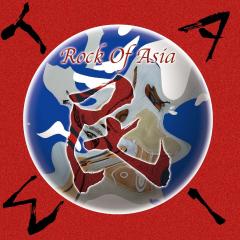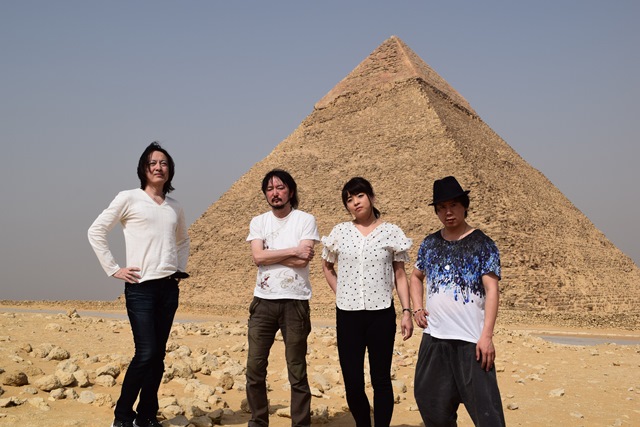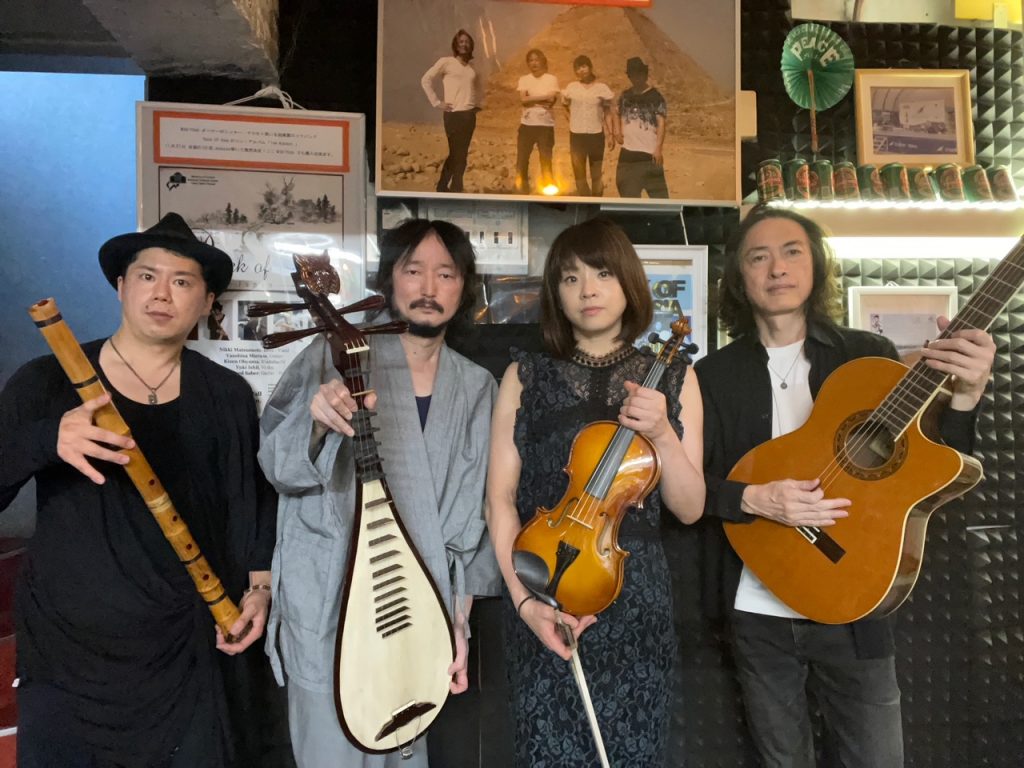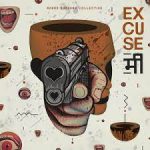Welcome to a World Music Special from us!
Around a year ago, we chatted with Nikki Matsumoto, the Japanese musician behind the Rock of Asia project. Nikki spent 15 years in the US, where he played professionally, and he returned to set up a unique band that plays a distinctive form of music, blending Western and Eastern instrumentalisation. When you enter the world of Rock of Asia, you hear the guitar and violin; but you also hear the Sanshin (a plucked string instrument), the Shakuhachi ( a Japanese Bamboo end flute), and the Biwa (short necked wooden lute).
Rock of Asia is:
Nikki Matrumoto (Vocals, Biwa, Sanshin, Guitars, Bass, Programming and Percussion)
Yasusisa Murase (acoustic Guitar)
Yuki Ishii (Violin)
Kizen Ohyama (Shakuhachi)

It has been an extremely busy year for Rock of Asia, from concerts to a new album. We began by asking Nikki to reflect on the past twelve months and bring us all up to speed with what has been going on.
Nikki- After I spoke to your magazine last year, I was already working on parts of the new album because I do everything! Of course, people do tell me that I have a band, but I write the lyrics, sing, and work on the music. I am lucky to have such talented people, but the songwriting is all mine. I play the guitar and work on the drum parts. The drum is a drum machine, but I write the arrangements for all of it, from the drums to the violin. I write the scores and pass them over to my musicians. When it went to my studio, I did the production side, worked on the press release, and planned the concerts. So it takes so much of my time, usually when you have a rock band, there is a collective very often, but since I’m doing everything, it takes me longer. If we look at the production of the album, it is totally self-produced; I work with no one else. I wish I could get some outside help, but these people can be very expensive. Rock of Asia is not on a label; we are an independent band. I finance the project as well, and do everything on my own. Only the jacket design for the CD is not mine; for that, I bring in an outside designer, as I can’t do that myself.
Many independent artists are now releasing a line of singles over the years rather than working on an album, which they find expensive to put together. Yet perhaps we lose something when we lose the album as a coherent concept and body of work.
Nikki- An album is, for me, very important. I like to listen to albums. I understand the logic behind releasing singles as opposed to albums, and there are artists who will release a line of singles every couple of months. That will keep the audience checking all the time, but I feel that is more for the pop artist. Younger artists may lack a connection to the album, but bands should be performing live, and the album should still be an aim. I listen to prog rock, metal, and west-coast music, and this time I came up with an umbrella concept for the new album. It is about the Japanese/Chinese letter TAMI 民. It is a letter that means ‘People.’ So the album holds the concept. The last album in November 2019 touched on the environment and global warming, and it was called “The Ancient.” This time it is more about people getting together, but it also includes a song about Ukraine.

That song is “Stranger in Homeland.” When we reviewed this in the magazine, Lorraine said of the track that it was her favourite on the album. ‘The music gives off a spectral feeling, and the violin is crying in the background. The vocals match closely and provide a lamenting feeling that suits the voice of Nikki Matrumoto. The track crosses musical cultures and works really well. I would also say it is the song with the broadest appeal on the album.’
Nikki- “Stranger In The Homeland” is about a Ukrainian man who’s stuck in Ukraine. He cannot leave; he may not participate in the war, but he cannot leave; he is trapped, and what can he do? The next song is called “Tomorrow” which is an instrumental song. They are connected. I didn’t want to end this album with a heavy subject. “Tomorrow” follows up and leads you to positivity. So the song orders are important. TAMI has a concept. It is a message, and that is the purpose of creating music. We also touch on capitalism and other things that impact us all.
The song order does matter, of course. And going back to the days of vinyl, you had no choice; you had to put the needle on and listen to the body of work as the artist presented it.
Nikki- We listen to music differently today, for sure, although it is all around us 24/7. But you should approach the album, look at the cover, check the sleeve, and then look at the lyrics. That is how my generation approached music when we were younger, but much of that has gone.
Returning to “Stranger in the Homeland,” our reviewer noted the wonderful violin sound “crying” in the background. We asked if the violinist Yuki Ishii had created that piece or if it was pre-written.
Nikki- That one I wrote the violin part on my own. When I write the music, I use the acoustic guitar, and then when I write the music, I can hear the violin part in my head. I don’t have to sit there and wait for the melody; it naturally comes to me. I have a synthesiser, and I try the violin part on there to make sure it fits and works. I record with the synthesiser, and only when I know it works do I go to the computer. I use music score software; otherwise, it would take forever in the old school! 90% of the time I do everything, but then I may ask the violinist to find her way with the music to see if it works, but that particular song was mine. Led Zeppelin was a big influence on me when I was younger, and I have always loved Jimmy Page, so music came naturally to me. Rock of Asia is more of an acoustic band, but we all have our influences.
Nodding towards the technology used in music now, the media has been talking a lot about the use of AI in music. For example, The remaining Beatles are using AI to help create a “new” Beatles song in 2024. How did Nikki view the presence of AI in music?
Nikki- I am in favour of AI. I think mankind has so many problems that we cannot solve. Look at the heat in parts of the world this summer; the earth is warming up. Can AI help us push towards the future? Maybe AI could help politicians, as AI is an outside, neutral guide. Politics is corrupt; they have problems with lobby groups, bribes, and so on; people are bought and sold. I support AI for our future. But musically, I hear about The Beatles and so forth, but then Eagles guitarist Joe Walsh said that AI could never throw a television out of a hotel window; it would never be rock n roll! Songwriters will come up with unique music. Men like Joe Walsh will always come up with great ideas; AI is not Paul McCartney and never will be. AI songwriting is easy; it can recreate older music, but it will always sound like what it draws from. I like bands that have variety and are not so predictable; otherwise, AI songwriting will just repeat itself.

Formulaic music has its place; we can all think of artists where you certainly know what you’re getting from song to song! Not many bands really get away with massive genre shifts (Queen did, but they are an exception). One of the good things about the new album from Rock of Asia is how effectively it changes style. It also develops from the 2019 release; when we heard it here,we detected a lot more jazz in there, perhaps, and in tracks on “Sunbright,” there is a strong folk influence.
Nikki- I listen to all kinds of music. People think of me as a Metal guy, as I spent those 15 years playing in Los Angeles, but I have always listened to Jazz and classical music for the last twenty years. I can hear that in bands like Queen and The Beatles, the way they vary their music. Otherwise, we return to the formula style of music; it is easy for the fan, the listener, as they get exactly what they expect. But I love all music, and my parents used to say I was crazy about music. Now, if I write a song, I try to be different and create a unique sound.
Music should never be paint-by-numbers; you should be prepared to throw the paint on the canvas and see what happens.
Nikki- I don’t want to criticise, but often in the 80s there was too much repetition; the era got tired.
We think we needed grunge in the same way we needed punk—to blast away the cobwebs. Music has to have those shocks sometimes to make it move forward. Our last question touched on the decision to do the Simon and Garfunkel cover on the album (“El Condor Pasa”). Was it, we wondered, a love of the song, or a love of the great duo that led to that?
Nikki- I was in the US for 15 years and never paid much attention to Simon and Garfunkel, as they were on the other coast from me. But then, in about 2008, I had an acoustic group, just two or three. This was before Rock of Asia, violinist, singer, and we were touring with a duo from Tasmania. Then I read that Simon and Garfunkel were playing the Tokyo Dome and I went along with this Tasmanian band to the concert. Now, I wasn’t really expecting anything, but I really liked it; they impressed me so much, especially a couple of songs like their adaptation of “Scarborough Fair.” So when I formed Rock of Asia, “El Condor Pasa” was the first cover we did. We played that song at the start and have played it ever since, and for some reason I never get tired of that song, but I can get tired of playing my songs quite easily!
And that ends our second talk with Nikki Matsumoto. We remain proud to support independent world music and believe there is so much in this album for the music lover to explore.
We have linked the music review below.
The album can be downloaded here.
The Rock of Asia Website is linked here.
We are very pleased you are here, and we hope you enjoyed the feature. Stick around and check out what else we do, we have features, reviews, poetry, and quizzes. Our magazine has free content without annoying pop-ups as you read. Help us keep it that way, look at our Amazon shops, and our exclusive merchandise (all designs are ours), as it really helps us!
By Mark C. Chambers
and
Lorraine Foley





The group, ROCK OF ASIA, have evolved sonically while maintaining a fresh outlook in the present raising awareness of current events affecting us all, as one people. The newly released album, “TAMI”, is evidence of this lyrically and stand strong on issues that affect, and effect, globally. Take a moment and listen to their music, which might enlighten one spiritually and sonically.